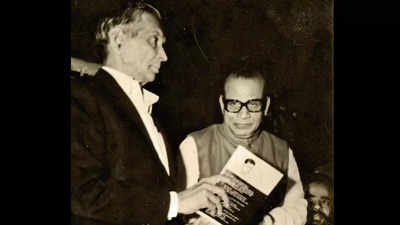- News
- City News
- ahmedabad News
- A tale of two Gujaratis: When a future PM gifted his book to PM
Trending
A tale of two Gujaratis: When a future PM gifted his book to PM
Book at Pradhanmantri Sangrahalaya in New Delhi sheds light on PM Modi's experiences as an RSS worker and underground activist during the Emergency, detailing the pivotal roles of various cities in resisting the period.

(L-R)Dr Viswanath Vanikar, a senior VHP member, Babubhai Patel, the then CM, and Narendra Modi at the book launch on Jan 14, 1978; (inset) a signed copy of the book
AHMEDABAD: A book on the dark days of Emergency, which today finds a pride of place at the Pradhanmantri Sangrahalaya in New Delhi, has an interesting history involving two Gujaratis, both Indian Prime Ministers.
'Sangharsh Ma Gujarat' - the first literary endeavour of Narendra Modi, was first presented by the latter, duly signed, to the then PM Morarji Desai at his residence in 1978.Besides giving a glimpse into the seminal period through the eyes of a 28-year-old Modi, then an RSS worker and an underground activist, the book also reflects the steely resolve of the man who rose through ranks to assume the country's most important job.
Morarji Desai was arrested on June 26, 1975, after the Emergency was declared. The period saw civil liberties being curbed and opposition leaders behind bars.
Book sheds light on Modi's experiences during Emergency
Morarji took charge as the PM on March 24, 1977. About 10 months later, on Jan 14, 1978, Modi received the first 3,000 copies of the book from Navajivan Press, the publisher, and gifted a copy to Morarji two weeks later, on Jan 31.
"In the book, PM Modi details his experiences as an RSS organizer (sanghatak) and observer (nirikshak) during the Emergency. He had evaded police surveillance for 20 months while carrying out underground activities against the Emergency," says Rizwan Kadri, a city-based historian and a member of the Prime Minister's Museum Library Society.
Morarji's son Kanti Desai, who carefully preserved the book for decades, handed it over to Kadri and the then Speaker of the Gujarat assembly, Ashok Bhatt, when they visited his Cumbala Hill home in Mumbai in 2010.
The book sheds light on the pivotal roles played by Ahmedabad, Bengaluru (then Bangalore), Mumbai, and Delhi as centres of resistance against the Emergency. Modi recounts the meticulous planning and organization required for underground activism, which included securing access to safe houses, communication channels and pre-designated meeting points within cities. He also describes his responsibility as a coordinator of activities in Ahmedabad and Gujarat during this time.
The book details a crucial method of communication employed by the RSS - a designated individual referred to as "Shri K" - would travel by air to these four cities every 10 days to deliver coded messages and strategize the movement.
'Sangharsh Ma Gujarat' - the first literary endeavour of Narendra Modi, was first presented by the latter, duly signed, to the then PM Morarji Desai at his residence in 1978.Besides giving a glimpse into the seminal period through the eyes of a 28-year-old Modi, then an RSS worker and an underground activist, the book also reflects the steely resolve of the man who rose through ranks to assume the country's most important job.
Morarji Desai was arrested on June 26, 1975, after the Emergency was declared. The period saw civil liberties being curbed and opposition leaders behind bars.
Book sheds light on Modi's experiences during Emergency
After his release in 1977, Morarji was instrumental in ensuring victory for the Janata Party. It was also the first time a non-Congress coalition formed a govt at the Centre.
Morarji took charge as the PM on March 24, 1977. About 10 months later, on Jan 14, 1978, Modi received the first 3,000 copies of the book from Navajivan Press, the publisher, and gifted a copy to Morarji two weeks later, on Jan 31.
"In the book, PM Modi details his experiences as an RSS organizer (sanghatak) and observer (nirikshak) during the Emergency. He had evaded police surveillance for 20 months while carrying out underground activities against the Emergency," says Rizwan Kadri, a city-based historian and a member of the Prime Minister's Museum Library Society.
Morarji's son Kanti Desai, who carefully preserved the book for decades, handed it over to Kadri and the then Speaker of the Gujarat assembly, Ashok Bhatt, when they visited his Cumbala Hill home in Mumbai in 2010.
The book sheds light on the pivotal roles played by Ahmedabad, Bengaluru (then Bangalore), Mumbai, and Delhi as centres of resistance against the Emergency. Modi recounts the meticulous planning and organization required for underground activism, which included securing access to safe houses, communication channels and pre-designated meeting points within cities. He also describes his responsibility as a coordinator of activities in Ahmedabad and Gujarat during this time.
The book details a crucial method of communication employed by the RSS - a designated individual referred to as "Shri K" - would travel by air to these four cities every 10 days to deliver coded messages and strategize the movement.
End of Article
FOLLOW US ON SOCIAL MEDIA










